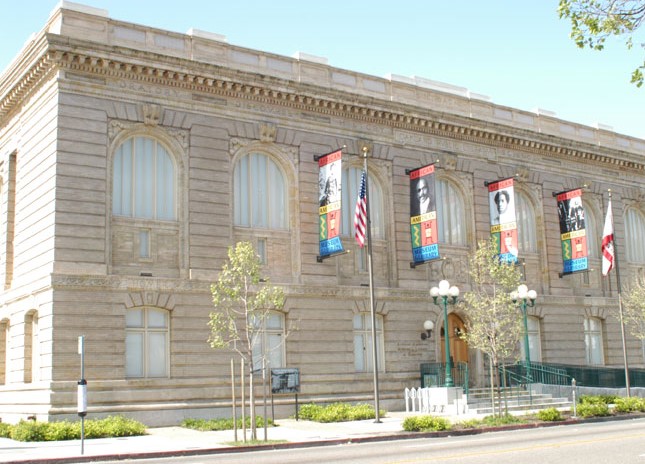Located at 659 14th Street in Oakland, California, the African American Museum & Library at Oakland (AAMLO) is both a reference library and museum that includes a non-circulating collection exclusive solely for institutional use. It, according to its website, is “dedicated to the discovery, preservation, interpretation and sharing of historical and cultural experiences of African Americans in California and the West for present and future generations.”
The AAMLO originally was a private collection first curated by Eugene and Ruth Lasartemay and Jesse and Dr. Marcella Ford in 1946. They collected artifacts, ephemera and oral histories of African Americans in Oakland, around the Bay area and throughout California. In 1965, their organization became known as the East Bay Negro Historical Society. As the collection grew, it needed a larger space and in 1970, the EBNHS moved into a storefront at 3651 Grove Street.
Six years later, it relocated to 4519 Grove Street and in 1982, the Society was moved into the Golden Gate Branch of the Oakland Public Library system. The invitation by the system marked the first time that an Oakland city library featured a predominantly African American collection.
After changing its name to the Northern California Center for Afro-American History & Life in 1988, it became incorporated as a public/private partnership with the City of Oakland in 1994. In 2002, this collaboration created the African-American Museum and Library at Oakland.
The museum and library moved into its present location within the Charles A. Greene Building in 2002. This site, a former Carnegie library, acted as the Oakland Main Library from 1902 until 1951. It was designed by architects Walter Danforth Bliss and William Baker Faville in 1900. This Beaux Arts building became No. 48 of the Oakland Designated Landmarks in 1981 and listed on the U.S. National Register of Historic Places in 1983.
At AAMLO, visitors may experience its extensive collections of materials, which include diaries, letters, manuscripts, microfilms, newspapers, oral histories, photographs and videos. The museum, which is housed on the second floor, features permanent and temporary exhibits and hosts accompanying programs. The subjects of the exhibitions are focused on the arts, culture and history of African Americans.
The following is sourced from the African American Museum & Library at Oakland website, detailing pertinent information about features of this national historic site:
The Archives
- AAMLO’s archival collection is a unique resource on the history of African Americans in Northern California and the Bay Area. The archives includes over 160 collections documenting prominent families, pioneers, churches, social and political organizations. Finding aids are available in the Online Archive of California and digitized items in our Calisphere. Freedom’s Journal, Liberator, California Voice, Sun Reporter, Muhammed Speaks, and the Black Panther newspapers are available on microfilm.
- Using AAMLO’s oral history collection, researchers can listen to interviews with local civil rights activists, educators, writers, and musicians. AAMLO is home to the Eternal Voices video library containing more than 80 years of African American East Bay history and Susheel Bibb’s Meet Mary Pleasant DVD (scholarly interviews, key issues and documents).
- The microfilm collection includes primary research information on African American enslavement, military service, California census records 1910-1930, Marcus Garvey’s Universal Negro Improvement Association, W.E.B. Dubois, Benjamin Banneker, Mary Church Terrell, Paul Robeson and others. The archives department is open from 12-4. To make an appointment, call 510.637.0198.
The Reference Library
- AAMLO has a unique, non-circulating reference library, a jewel for researchers, students, and anyone interested in African American history. Its collection consists of approximately 12,000 volumes by or about African Americans. Among its many subjects are books on religion, the military, Martin Luther King, Jr., Malcom X, the Black Panther Party, Africa in relationship to the African-American experience, genealogy, and California history.
- A collection of children’s books highlights award-winning titles. Patrons can access on-line databases or thumb through James de T. Abajian’s Blacks in Selected Newspapers, Censuses and Other Sources.
- One recent acquisition is the new, eight-volume set African American National Biography, containing over 4,000 entries written by distinguished scholars and edited by Henry Louis Gates. The reference library offers access to local and out of state newspapers, scholarly journals, and six computers with word processing and Internet access.
- The library owns about 400 videos and DVDs which can be viewed on-site. Library staff are available to assist with research questions or browsing and enjoyment of the collection.
- AAMLO also has a Seed Lending Library. Anyone is welcome to come in and check-out seeds. No library card is needed. We ask that you sign out for the seeds, then let some plants go to seed and return some of these next generation seeds for others to borrow.
